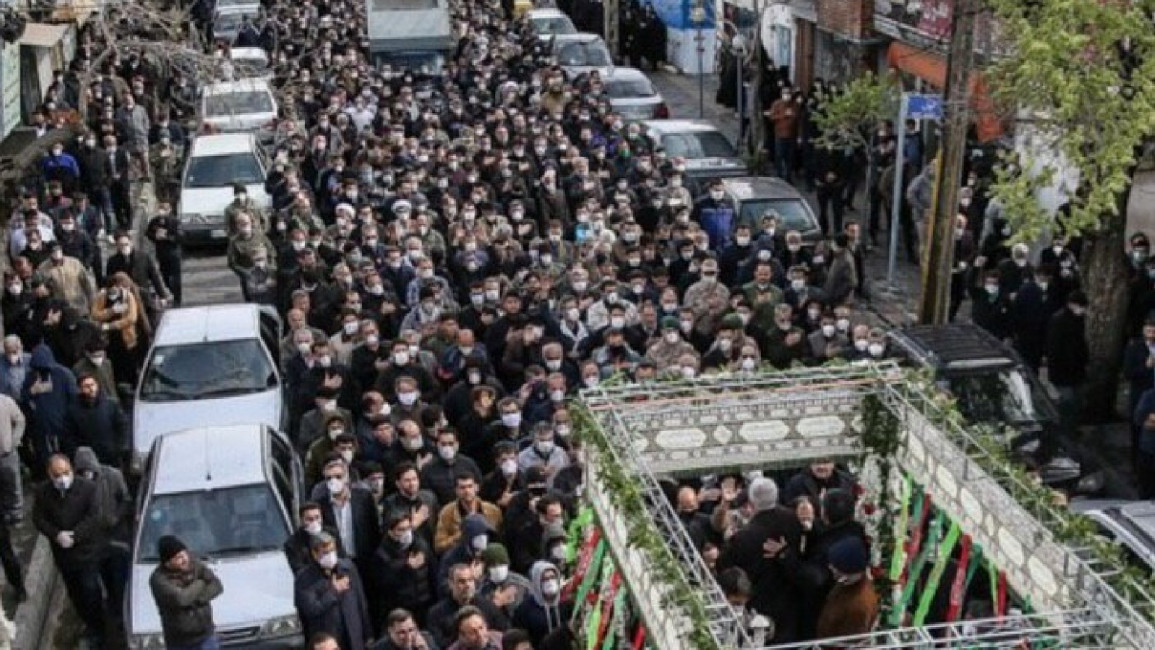Thousands of mourners ignore Iran's coronavirus social distancing rules to attend Revolutionary Guards funeral
The funeral procession of Hussein Asadallah in the Iranian capital saw thousands of mourners come together despite the government banning gatherings as part of measures to slow down the spread of the deadly disease.
"So this is the new protocol for funerals in order to curb mass gatherings? The pictures speak for themselves. All we can do is cry. There are no words," said Kianush Jahanpur, Head of Public Relations and Information Centre at Iran's Ministry of Health and Medical Education, on Twitter.
"Today, the greatest sin is to gather in large groups. Instead of telling people whether other things are right or wrong, ensure they avoid committing this sin," he added in a later tweet.
Read also: Hezbollah fighters tested for coronavirus before leaving for Syria as country fights off virus
The spokesman of the IRGC responded to criticism of the funeral online saying the "cautious participation of citizens, colleagues, and lovers of Brigadier General Asadallah in the funeral and burial was spontaneous".
"The Islamic Revolutionary Guard sees itself obliged to abide by the measures and decisions of the National Committee to combat the coronavirus by avoiding any gatherings," he added, according to Tasnim news agency.
He assured Iranians that the Guards "had no plans to organise a public funeral for the general".
Asadallah was pronounced dead on Saturday due to lung issues allegedly sustained from a chemical injury during the Iran-Iraq war three decades ago. Authorities rejected allegations he had contracted the deadly coronavirus, which also affects the respiratory system.
Twitter Post
|
Iran has been hit hard by the outbreak of coronavirus with more than 24,8111 cases in the country and 1,934 deaths, which have piled pressure on its already resource depleted health services.
A number of Iranian ministers, MPs and generals have been infected by the disease, sometimes with fatal consequences.
Earlier this month, Nasser Shabani, a top commander in Iran's IRGC forces was confirmed dead from the disease.
Tehran has appealed to the international community to ignore US sanctions on the country, which it claims is creating a humanitarian in Iran.
On Monday, the European Union responded to those calls and announced it would provide 20 million euros in aid to sanctions-hit Iran to assist with its major coronavirus epidemic.
Read also: Khamenei slams 'strange' US offer to help fight coronavirus while crippling sanctions remain
"We've not been able to provide a lot of humanitarian help but there is some 20 million euros in the pipeline ... that we expect to be delivered over the next weeks," Borrell said, according to Reuters.
"We also agree in supporting the request by Iran and also by Venezuela to the International Monetary Fund to have financial support," he said in a video conference with other EU foreign ministers.
That came shortly after Norway said a United Nations fund could soon be set up to assist countries with strugging healthcare sectors due to the coronavirus pandemic.
The initiative, which has been welcomed favourably by UN deputy secretary general Amina Mohammed, is expected to be set up quickly, "possibly even this week", Norway's Development Aid Minister Dag-Inge Ulstein said, without specifying the amount of its own contribution.
"We are concerned about the way the virus will affect developing countries which have fragile healthcare systems," the official said.
"International solidarity across borders is more important than ever. That's why it is important for us to contribute financially to such a fund in the UN," he added.
The COVID-19 virus, which was first detected in China's Wuhan in December, has killed more than 16,758 people worldwide, while over 387,322 infections have been confirmed.
As of yet, there are no known treatments for the virus, though more than 102,404 have already recovered from the infection.
Follow us on Facebook, Twitter and Instagram to stay connected


![President Pezeshkian has denounced Israel's attacks on Lebanon [Getty]](/sites/default/files/styles/image_684x385/public/2173482924.jpeg?h=a5f2f23a&itok=q3evVtko)



 Follow the Middle East's top stories in English at The New Arab on Google News
Follow the Middle East's top stories in English at The New Arab on Google News


